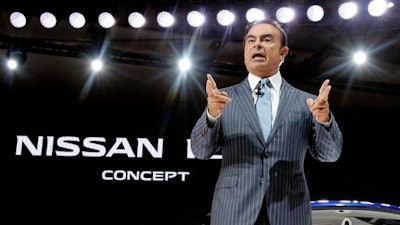
TOKYO (AP) — Nissan Motor Co. former chairman Carlos Ghosn, charged with financial improprieties and detained in Tokyo for more than a month, has also been accused of a breach of trust that caused a multi-million-dollar financial loss for Nissan.
Speculation that he could leave on bail surged on Thursday after a court rejected prosecutors' request for extended detention. The fresh allegation dashes his hope for a quick release, forcing him to spend Christmas at Tokyo's main detention center. A look at what is going on and what could happen next:
Q: WHAT IS THE NEW ALLEGATION?
A: Prosecutors on Friday accused Ghosn of a breach of trust causing Nissan a financial loss of more than 1.8 billion yen ($16 million). The allegations represent a third potential charge in Ghosn's case. Prosecutors say Ghosn allegedly manipulated a contract to shift a loss from a private investment during the Lehman crisis onto Nissan's books. He also allegedly had Nissan transfer $14.7 million to another company owned by someone who helped him in that manipulation in a breach of the company's trust, prosecutors say. The latest allegation does not affect Greg Kelly, another Nissan board member charged with underreporting Ghosn's income by about 5 billion yen ($44 million) in 2011-2015.
Q: HOW MUCH LONGER WILL HE BE IN FOR?
A: Adding an allegation to an existing case is called "saitaiho" in Japanese, or to re-arrest, even when a suspect is already in custody. Japanese police and prosecutors routinely add new allegations to lengthen a defendant's time behind bars, since each allegation may add up to 20 days. The tactic is criticized from inside and outside Japan as "hostage justice." Friday's new allegation would allow prosecutors two days before seeking a likely court approval of extending Ghosn's detention up to 20 more days, meaning he would have to stay in the Tokyo Detention House until Jan. 11, way past Christmas and New Year holidays, most likely without turkey or pumpkin pie. But his right-hand man, Kelly, may be released as early as Christmas, with a request for bail filed Friday by Kelly's lawyer pending court approval.
Q: WHAT ARE CHARGES HE ALREADY FACES?
A: So far, Ghosn and Kelly are charged with underreporting Ghosn's pay by about 5 billion yen ($44 million), in violation of the Financial Instruments and Exchange Act. They also face a second allegation of underreporting another 4 billion yen ($36 million) for 2016-2018, for which their first 10-day detention expired on Thursday. Prosecutors have been criticized for separating the same allegations into two parts as a tactic to double their detention time.
Q: HOW COMMON ARE LONG DETENTIONS IN JAPAN?
A: Ghosn's more than a month in detention is still short compared to some past high-profile cases. Critics say defendants who refuse to admit to the allegations tend to be detained longer. In 2002, parliamentarian Muneo Suzuki was detained for 437 days over bribery charges before he was released on bail. In 2009, a senior health ministry bureaucrat, Atsuko Muraki, was detained for 164 days in alleged violation of postal services law. She was later acquitted. In 2006, an internet startup maverick Takafumi Horie, charged with fraudulent accounting, was detained for 95 days.






















